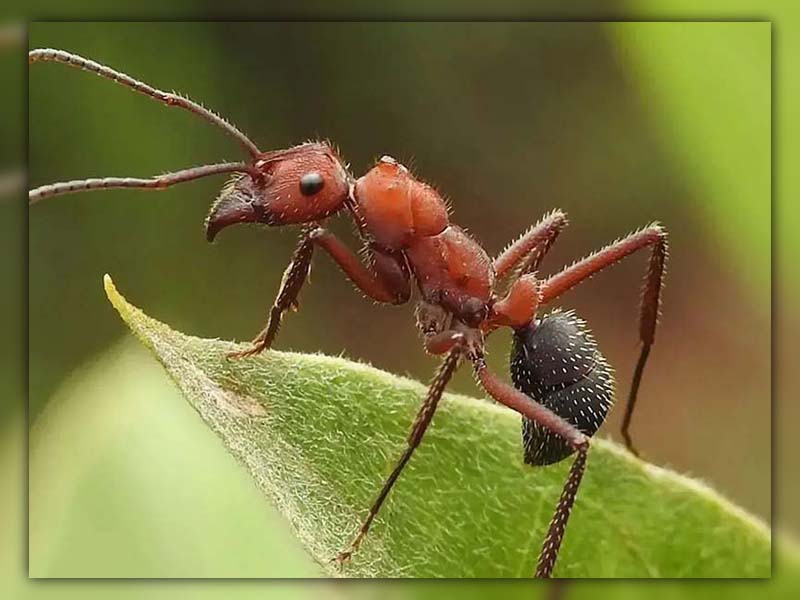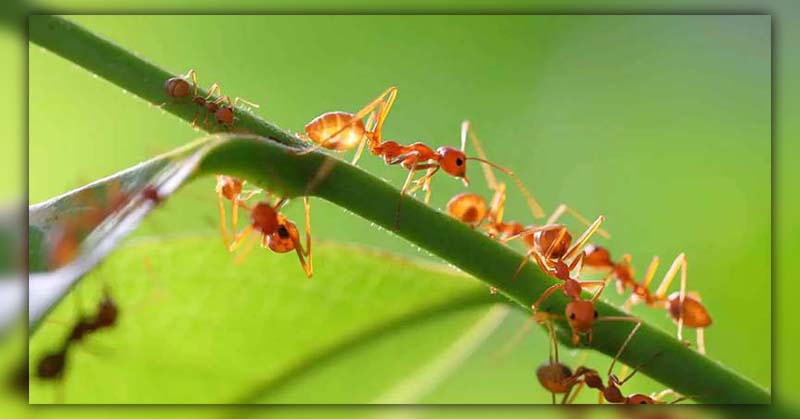Have you ever wondered: “Can ants die from falling?”
In this blog, we’re delving deep into the world of ants, terminal velocity, and their uncanny survival skills.

Can ants die from falling?
Absolutely not. Ants possess an exceptionally light body structure (low density), resulting in air resistance counteracting any potential harm from falling.
This phenomenon prevents them from attaining a speed that could jeopardize their well-being.
Why don’t ants die when they fall?
Ants are remarkable creatures that defy the odds of injury when falling. Their survival can be attributed to several fascinating factors:
Ant bodies are very lightweight
An average ant weighs between 2 to 4 mg. This might seem tiny, but it’s crucial to their survival.
Unlike many animals, ants don’t have intricate organs like lungs or a complex heart. This not only makes them more resilient but also keeps them light.
An ant’s body is divided into a head, thorax, and abdomen. The abdomen is slightly heavier, but overall, their body structure supports their lightweight nature.
Lighter objects experience less force when they fall. So, when an ant falls, gravity doesn’t pull it down as harshly as it would a heavier creature.
Lower body mass means that when ants hit the ground, they do so gently. In contrast, heavier animals experience a more forceful and often damaging impact.
In essence, ants’ lightweight nature not only helps them survive falls but also showcases the fascinating adaptability of these tiny creature.
Ant legs are very strong
Ant legs branch out from the thorax and have three to five segments. The strength of their legs emanates mainly from the second segment.
For such tiny creatures, they’re fast! They can dash 2 to 3 feet within just a minute.
An ant’s legs aren’t just for running; they act as shock absorbers during falls, minimizing damage.
With sharp claws, adhesive pads, and fine hair, ants can traverse challenging terrains, whether it’s slippery, vertical, or irregular.
No matter the surface, whether it’s concrete, gravel, or garden soil, ants are pros at maintaining a sturdy grip.
Ants will touch the ground very slowly when they fall
Typically, worker ants measure between 0.7 to 1.2 inches, while the queen reigns supreme, a tad larger due to her more prominent abdomen and head.
Although the queen is around 1.5 to 2.5 inches – bigger than her colony mates – in the grand scheme of insects and animals, she’s still relatively small.
Smaller body? Bigger surface area relative to mass. For ants, this means less air resistance, akin to a feather gently floating down from a balcony.
Unlike the loud thuds of heavier objects, ants touch down softly, almost silently.
Their lightweight design ensures ants don’t plummet rapidly. This gentle descent mitigates the risks of severe injuries.
After a fall, ants don’t just lie there. They’re up and about in no time, capable of healing minor scrapes swiftly.
In essence, ants’ diminutive size coupled with their unique anatomy ensures that even a fall doesn’t slow them down.
These tiny warriors are proof that size doesn’t always dictate strength or resilience!
Ants have very small energy reserves
Ants don’t require as much energy as larger creatures. They feed minimally but effectively, harnessing just enough fuel for their tasks.
Among ants, workers need the most energy. They’re always on the move, exploring and gathering, whereas queens and others might rest more.
When objects fall, they convert their potential energy into other forms, like sound and heat. Heavier objects make a noticeable sound upon impact.
With their petite bodies, ants store less energy, so there’s not much to release during a fall. This means you won’t hear an impact sound or see any injury, even if an ant drops from a tree.
Ants have a strong exoskeleton
Like large animals with internal skeletons, ants boast an external one, making them arthropods. This hard exoskeleton, primarily made of chitin, shields their innards efficiently.
Without bones to break, ants can take minor falls in stride, brushing off impacts that would harm bone-structured creatures.
Their exoskeleton is not just for show. Ever tried stepping on one? They often endure, thanks to the protective properties of their armor-like exterior.
The combination of their exterior armor and lack of complex internal structures means they’re less prone to serious injuries like blood loss or organ damage.
Tossing an ant from a balcony won’t deter it. These hardy insects can bounce back from such situations and might just find their way back into your home in search of sustenance.
When do ants die from falling?
Ants exhibit impressive resilience to falls in most scenarios. However, certain conditions can lead to their demise:
- Heavy Attachments: Attaching a heavy object to an ant, like a stone or brick, can increase its weight significantly. This added mass results in a higher impact upon landing, potentially causing bodily harm or limb breakage.
- Water Hazards: Ants dropped into water bodies, such as ponds, may struggle to maintain a floating position due to their small size. In such cases, they might not survive for an extended period.
- Isolation: Some ants become separated from their colonies after falling from trees or upper-floor nests. Isolated ants lack the support and resources of their colony, making survival challenging and leading to eventual demise.
Will an ant die if it falls off a building?
Fear not, for an ant’s survival is virtually assured even after falling from a building. Their robust exoskeletons render them remarkably resilient.
The height of the fall isn’t a major concern; in fact, their terminal velocity, which they reach relatively quickly, ensures a safe descent long before they reach the ground.
Can an ant survive when falling from the Empire State Building?
Rest assured, an ant possesses the ability to survive a fall from the iconic Empire State Building. The ant’s terminal velocity, the maximum speed it attains during free fall, is not sufficient to cause harm upon impact with the ground.
Therefore, regardless of the impressive height, such as that of the Empire State Building, the ant will indeed emerge unscathed.
Will an ant die if it reaches terminal velocity?
Much like how Newton’s Third Law says every action has an opposite reaction, this principle shines a light on the intriguing world of ants and gravity.
When objects fall, including ants, they eventually hit a maximum speed known as ‘terminal velocity’. This speed is influenced by three main factors: the pull of gravity, the weight of the object, and its shape.
Consider a perfectly shaped ball; if it’s heavy, its terminal velocity is high. In the insect kingdom, an ant’s terminal velocity is about 6.4 Km/h. For comparison, humans have a staggering terminal velocity of 200 Km/h.
That’s why an ant can survive a tall tumble—it’s not falling fast enough to get hurt. Remember, it’s not the fall that’s deadly, but the sudden stop at the end.
The energy from the motion gets converted into impact force. At 6.4 Km/h, an ant can brush off a fall like it’s nothing, but for a human, it’s a different story.
What Is Terminal Velocity?
Many audience pointed out the tiny size and weight of ants actually work to their advantage when they fall! Ants and small insects have a surprising advantage when it comes to falling.
Their size and weight mean they fall at a much slower speed (a mere 6.4 km/h for ants) compared to humans who can reach speeds up to 200 km/h.
J.B.S. Haldane’s 1928 essay highlights an interesting point: smaller creatures face less risk from falls due to the proportionally greater air resistance they experience.
This means while a mouse might walk away from a significant fall, larger animals like humans or horses face higher risks.
As Haldane put it, if you shrink an animal’s dimensions tenfold, its weight decreases by a thousand times, but its surface area only by a hundred times.
Simply put, tiny insects like ants have a built-in shield against gravity, allowing them to safely fall and even effortlessly cling to surfaces.
Is the landing surface important when an ant falls?
As highlighted earlier, the terminal velocity of tiny insects, including ants, is relatively low, minimizing the impact when they reach a stationary surface.
An ant’s resistance upon landing is directly related to its surface area. While larger ants might experience a slight shock upon encountering uneven surfaces, they often recover swiftly.
When it comes to the effects of falls, the nature of the landing surface gains significance as animal size increases.
For instance, landing on a soft and yielding surface like a mattress or balloon can determine survival for larger creatures such as humans.
However, this distinction holds little relevance for ants, for whom the choice of landing surface is of relatively minor consequence.
Can an ant survive a fall from the Empire State Building if it lands on a pillow?
Falling from any height poses risks, and the landing surface matters greatly. A pillow offers a more forgiving landing spot compared to natural terrain.
Rest assured, even a firm landing won’t prove fatal to an ant. Therefore, an ant dropping onto a pillow from the Empire State Building height wouldn’t spell doom.
Ants capitalize on their mass-to-air resistance ratio, granting them an edge. Moreover, their technique of falling with fully extended legs enhances their gliding ability, effectively lowering their already low terminal velocity.
FAQs
Can ants die from injury after falling?
Ants are remarkably resilient creatures. Their bodies are shielded by a sturdy exoskeleton, preventing significant damage upon impact.
Unlike larger organisms, ants’ organs remain protected within this exoskeleton, reducing the likelihood of injury and subsequent death.
Additionally, ants lack pain receptors, making them less susceptible to fatal injuries caused by pain.
Would an ant die from falling from the sky?
No, ants possess traits that enable them to survive falls even from great heights.
Due to their small size and low terminal velocity, which is the maximum speed they reach during freefall, ants do not attain lethal speeds during their descent.
Their diminutive size, combined with air resistance, acts as a safeguard against fatal impacts, allowing them to endure falls from significant heights.
Conclusion
In the realm of nature’s tiniest wonders, the question ‘Can ants die from falling?’ has led us on a journey through physics, adaptation, and the remarkable resilience of these miniature adventurers. As we wrap up this exploration, remember that even in the face of gravity’s pull, ants emerge victorious.
If you’ve enjoyed uncovering the secrets behind their survival, don’t miss out on more intriguing insights from Pestweek.

Calina Mabel has over 15 years of experience in the field of journalism and communications. Currently, Calina Mabel is the Content Writer for categories such as Cockroach, Ants, Bed Bugs, Mosquito, Rodent, Termite, and Flies on Pestweek.com. She aims to build content for these categories with a focus on providing valuable and accessible information to readers, in order to create the world’s largest knowledge community about Pests.
All content written by Calina Mabel has been reviewed by Emily Carter.




